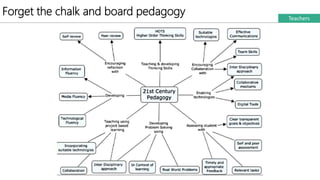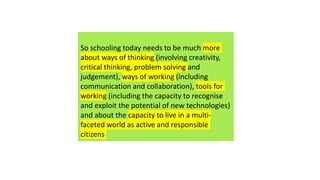EXPECTIONS FROM CBSE SCHOOLS NEP 2020
- 1. EXPECTATIONS FROM CBSE SCHOOL NEP 2020 11.12.20
- 2. Schools now need to prepare students for more rapid change than ever before, to learn for jobs that have not yet been created, to tackle societal challenges that we can’t yet imagine, and to use technologies that have not yet been invented. And they need to prepare students for an interconnected world in which students understand and appreciate different perspectives and world views, interact successfully and respectfully with others, and take responsible action toward sustainability and collective well-being.
- 3. Contents Schools • Planning • Enable Access/Retention • Follow Frameworks/Guidelines • Provide Resources Teachers • Build Capacities At all levels • Teachers must be qualified • Forget the chalk and board pedagogy • Achieve Standards • Adopt cross cutting themes • Engage with parents for a positive learning environment Student learning • Assessment is not for judging students, its an opportunity • Track to have their back Non-negotiable
- 4. Child at the center of everything we do!
- 5. Schools
- 6. Plan, Plan, Plan! Plan for activities based on NEP 2020 Plan for activities based on NEP 2020 • School Development Plan including ECE • Plan for CWSN and Gifted children • Plan for inclusion of SEDGs Upgrade Pedagogy • Incorporate latest pedagogy methods as per the needs of 5+3+3+4 structure of curriculum • Plan lessons grounded in real-life situations • Plan to promote multilingualism • Implement plan for attaining universal FLN Track student learning • Plan to track learning of each child • Create holistic report card that captures uniqueness of a child • Approach the assessment as per new exam pattern (focus on competencies) Schools
- 7. Plan, Plan, Plan! Schools
- 8. Enable Access and Retention COVID 19 Impact: Learning loss and perhaps loss of interest in schooling must be mitigated • Track each child and ensure there are no drop outs • Ensure educational access and retention of SEDGs • Help each child to continue education through RTE Entitlements • Involve all stakeholders in the child’s learning process and journey (parents, local administration etc) • Enhance and enrich student learning through innovative pedagogy • Create safe and conducive environment for learning and teaching • Access to alternate forms of schooling • Maintain inclusive and clean infrastructure – Disabled friendly access, drinking water facilities, working and clean toilets, sanitary napkin vending machines, facilities for teachers such as staff rooms etc. Schools
- 9. Follow framework and guidelines • Monitoring/Tracking of Health status of Children through periodic health check–up • Engaging peer groups and other local • National guidelines on assessment standards to be achieved • Identification and nurturing of Gifted Children at the Elementary and Secondary stages • Safety and security guidelines • Facilitating Twinning between public and private schools in the state/UT. • Implementing of vocationalisation from grade 6 • Guidelines, resources, support material for teachers on multilingualism, to harness the power of language • National Curricular Framework and Curricular literacy • For fun courses on vocational crafts through NCFSE for all learners to take during grades 6-8 • Development of Holistic Progress Card • Implementation of the FLN Mission • To assist the states/UTs for holding the census exams in grades 3,5 and 8 • School Quality Assurance and Accreditation Framework (SQAAF) by SCERT Framework Guidelines Schools
- 10. Provide resources Schools • High quality and diversified Student and Teacher Resources/Learning Materials, including e-learning resources (DIKSHA) • Proper and well-equipped Labs • Well-trained Sports teachers. Playgrounds and sports equipment • Art and craft, vocational resources • Counsellors • Special Educators • Learning materials for the differently abled- Braille books, audio books etc. • ICT labs and language labs • Library – online and offline • Book banks for SEDGs • Access to Digilocker for HPC
- 11. Teachers
- 12. Build Capacities at all levels Teachers • Build capacities of School management, Heads, teachers, staff, parents, community/volunteers • Minimum 50 hours CPD per year for heads and teachers • Mentoring of teachers/schools by HEIs • NISHTHA to be compulsorily completed by all teachers • Training regular teachers to teaching some appropriate vocational subjects and training of vocational teachers
- 13. Build Capacities at all levels Teachers
- 14. Teachers to be specially trained in Teachers • Identifying/recognising and nurturing unique potential of every child • Curriculum and pedagogy of ECCE/FLN • Use of technology platforms such as SWAYAM/DIKSHA • Basic health indicators to look out for and monitor in children. • Teaching Indian Languages • Shift in teaching learning from rote to inquiry based, critical thinking , cognitive learning and applied methods • Teaching-learning in classes 1 to 5 through a bilingual approach that focuses on the mother tongue • To undertake “assessment as learning” and “assessment for learning” at elementary level • Implementing Holistic Progress Card • For promoting talent amongst students. • Inputs on safety, health and environment in schools, particularly in relation to the COVID-19 pandemic
- 15. Teachers must be qualified Teachers • Aim of NEP: Ensure that all students at all levels of school education are taught by passionate, motivated, highly qualified, professionally trained, and well-equipped teachers. • Qualifications in accordance with NCTE regulations • The TETs will be extended to cover teachers across all stages - Foundational, Preparatory, Middle and Secondary. • Teachers in private schools must have qualified similarly through TET, a demonstration/interview, and knowledge of local language(s). • Balvatika to have an ECCE qualified teacher • 4-years integrated B.Ed to be preferred by 2030. • Career progression and incentivisation • Vocational education teacher training
- 16. Forget the chalk and board pedagogy Teachers • Framework for giving more autonomy to teachers in choosing aspects of pedagogy they find most effective for the students in their classrooms • Competency-based multi-disciplinary education • Experiential learning and Activity-based learning • Toy-based pedagogy • Art-integration • Sport-integration • Story-telling pedagogy • ICT integration 5 3 3 4 + + + flexible, multilevel, play/activity-based learning building on the play, discovery, and activity-based pedagogy multidisciplinary study that builds on the subject study, but with greater depth/critical thinking/flexibility/choice of subjects, that also leads to developing life aspirations introduction of subject teachers for learning and discussion of the more abstract concepts in each subject; Experiential learning within each subject, and explorations of relations among different subjects
- 17. Forget the chalk and board pedagogy Teachers
- 18. Achieve standards Teachers • Ensuring equivalence of academic standards among learners across all school based on standards and guidelines developed by PARAKH • PARAKH will prepare national guidelines on assessment standards to be achieved • National Professional Standards for Teachers (NPST) will be developed by 2022, by NCTE • The standards would cover expectations of the role of the teacher at different levels of expertise/stage, and the competencies required for that stage. • States/UTs will set up an independent, State-wide, body called the State School Standards Authority (SSSA). • The SSSA will establish a minimal set of standards based on basic parameters (namely, safety, security, basic infrastructure, number of teachers across subjects and grades, financial probity, and sound processes of governance). • The transparent disclosure of all financial, academic, and operational matters will be expected by schools through SSSA.
- 20. Adopt cross cutting themes Teachers • No silos • Flexibility • Connecting to the child in mother-tongue, Multilingualism • Competency-based with a multidisciplinary approach • Computational and Mathematical Thinking and Scientific temper • Vocational and skill education • Knowledge of India • Value education • Gender • Inclusion • ICT • Innovation • Convergence/rationalisation/twinning • Local culture and context • Citizenship and instilling of national pride • Connect children to the issues of national importance
- 21. Adopt cross cutting themes Teachers
- 22. Engage with parents and community for a positive learning environment Teachers • Home visits; Inform parents about expected learning outcomes, portfolios, home assignments, etc. • Sensitize parents of children with physical and learning disabilities, first generation learners • Arrange workshops on parenting, and particularly on exam related anxieties and other stress • Engage with parents to deal with substance abuse , sexual orientations and other adolescence issues • Constantly send information about the activities in the school, and child’s progress • Send portfolios back to parents for review and feedback. • Inform parents about what kind of assistance the child needs at home for learning. • Newsletters, e-mails, blogs, memos etc. can be a regular feature. • Parents as volunteers for FLN/field visits, sports/art exhibitions, annual function, school magazine, etc. • Exposure lecture by parent specialists - a counsellor, doctor, sportsperson, filmmaker, etc. • Have a parent representative for your class, who can help you with the PTMs. • You may have specific events only for parents. • Involve parents in the community outreach work undertaken by the school.
- 23. Engage with parents and community for a positive learning environment Teachers
- 24. Student Learning
- 25. Assessment is not for judging students, its an opportunity S. Learning • Educational outcomes will be incorporated suitably in the assessment of schools by SSSA • For secondary education, CBSE will prepare assessment and evaluation procedures for its affiliated schools/students, for implementation from 2022-23 session onwards. • NCERT/PARAKH will prepare framework and guidelines for Holistic Progress Card • NCERT, CBSE to prepare question banks for competency-based items that test higher-order skills • Examinations to test achievement of basic learning outcomes, through assessment of core concepts and knowledge along with relevant HOTS and application of knowledge in real-life situations. • Some other possibilities include: • a system of annual/semester/modular Board Exams could be developed • all subjects and corresponding assessments, beginning could be offered at two levels • Tests to have two levels of Difficulty • Moving to adaptive testing
- 27. Track to have their back – Monitoring and Tracking student learning S. Learning • System for tracking student growth allows teachers to determine which students are learning and which ones are not • Tracking each child beginning with Foundational levels • Tracking proficiency levels in achievement of LOs – each child to achieve mastery over LO • Aggregated/anonymised data • Unifying/linking database – SSSA and OASIS • Pre-assessments - a great way to find out what students already know and what still needs to be taught before a unit or lesson • Peer tutoring allows students to have more opportunities for assistance. • Pre-teach concepts to students who may struggle with the material. • Re-teach using post assessments - if say, greater than 20 % students receive less than an 80% pass rate on an assignment, re-teach the lesson to entire class.
- 28. Non-Negotiables
- 29. Track to have their back • Child centric and Inclusive • Inclusion • Teacher quality • Safety • Diversified TLM • Competency-based education and flexibility • Quality of classroom transactions, Pedagogies • Performance tracking • Skill development • Sports • Arts and Craft
- 31. So schooling today needs to be much more about ways of thinking (involving creativity, critical thinking, problem solving and judgement), ways of working (including communication and collaboration), tools for working (including the capacity to recognise and exploit the potential of new technologies) and about the capacity to live in a multi- faceted world as active and responsible citizens
































